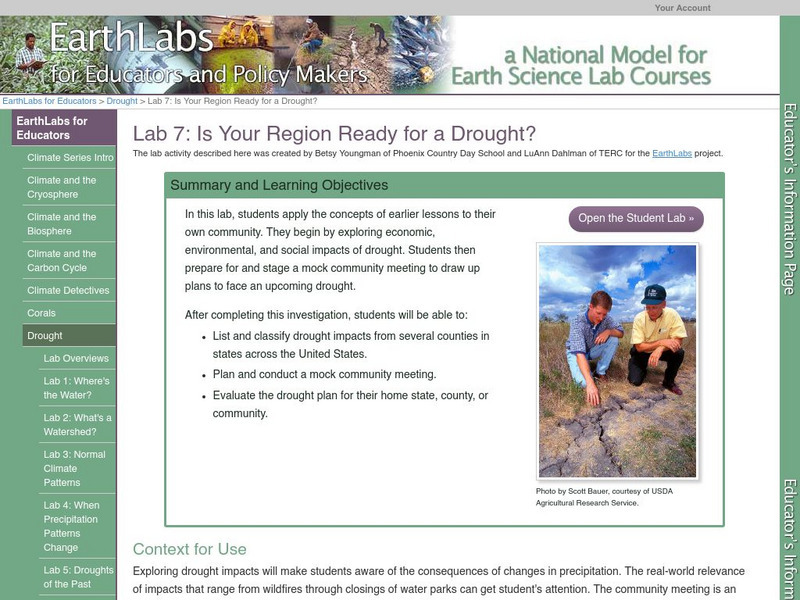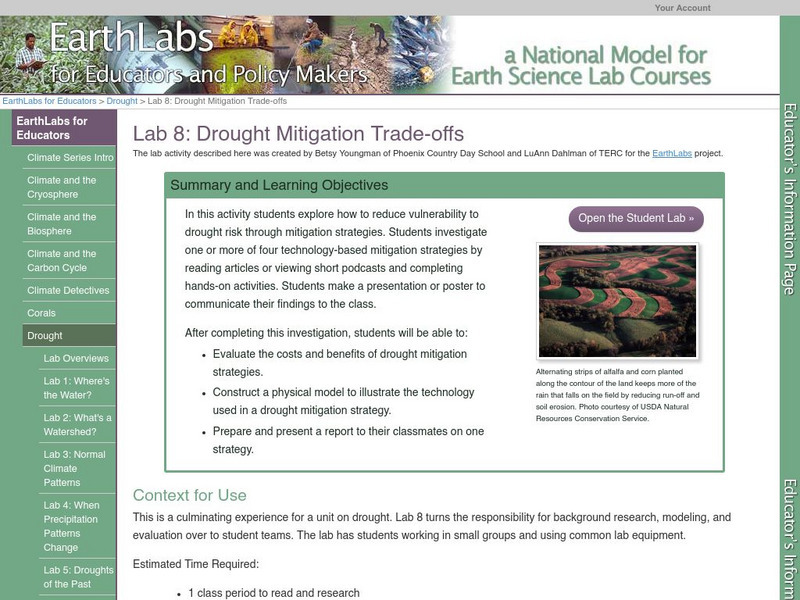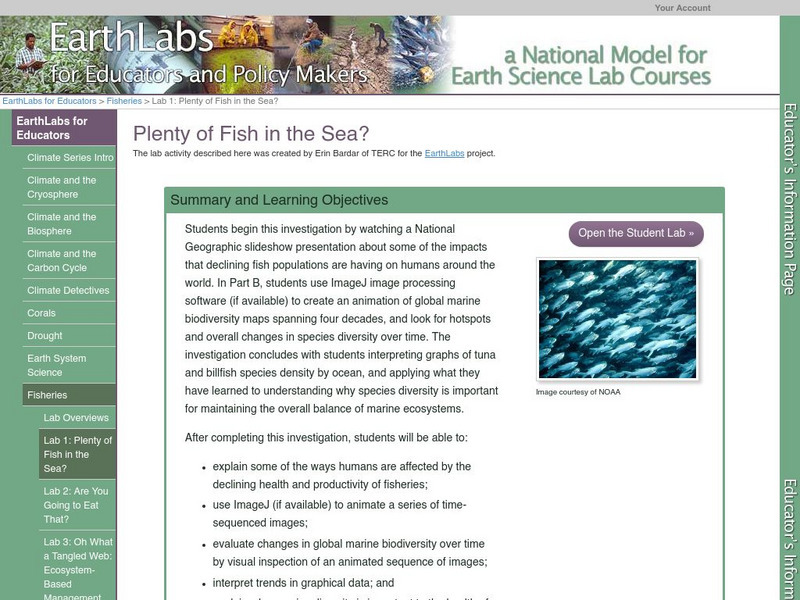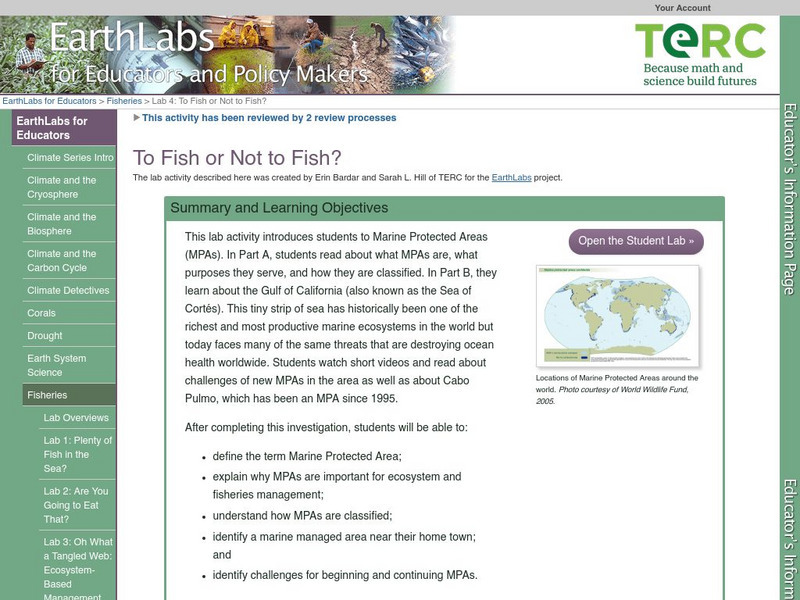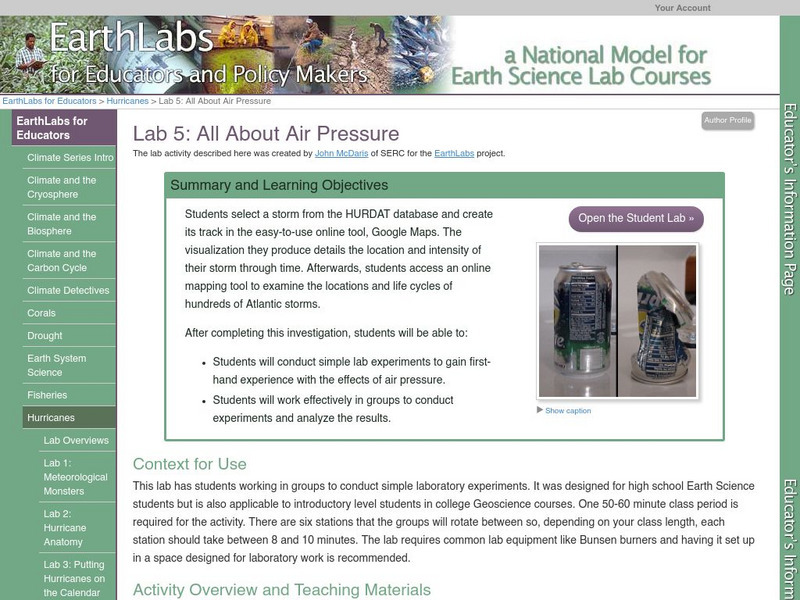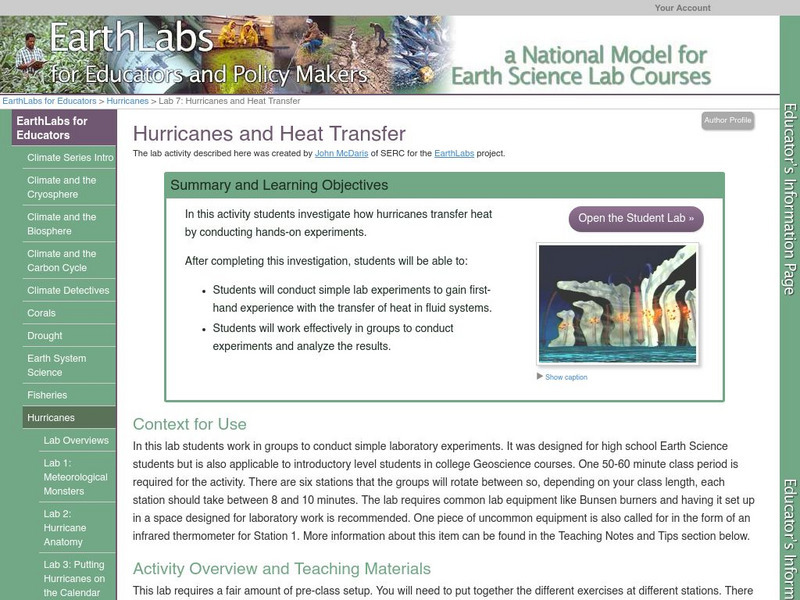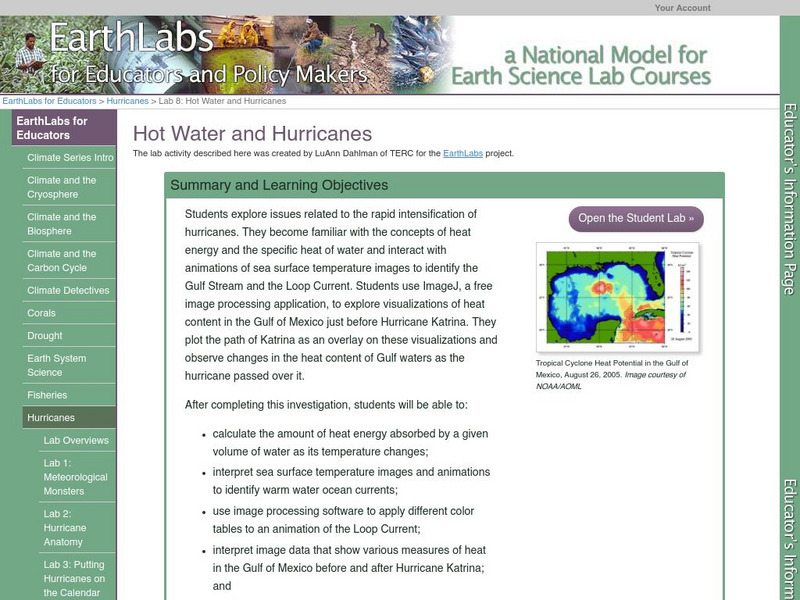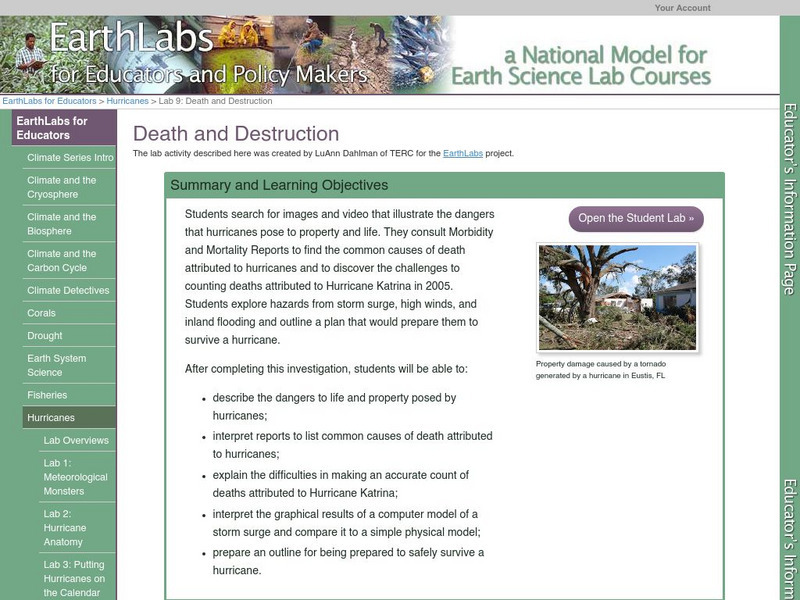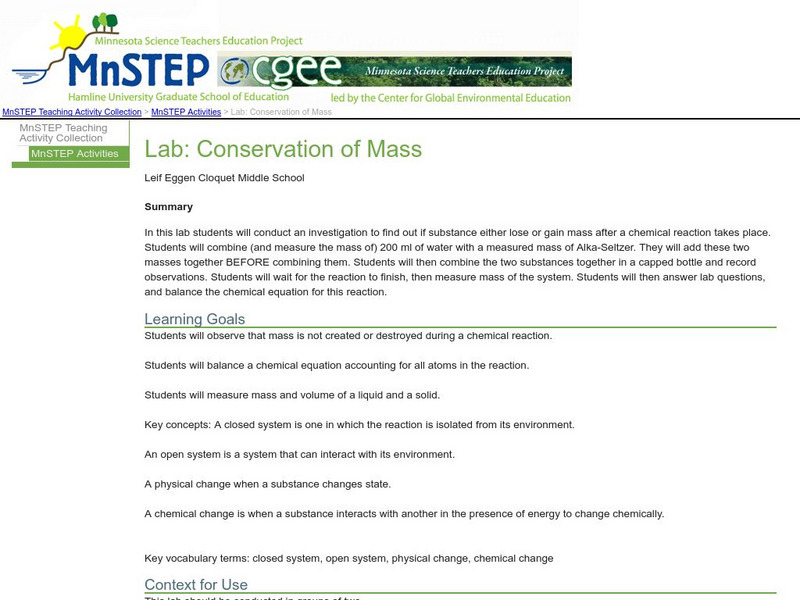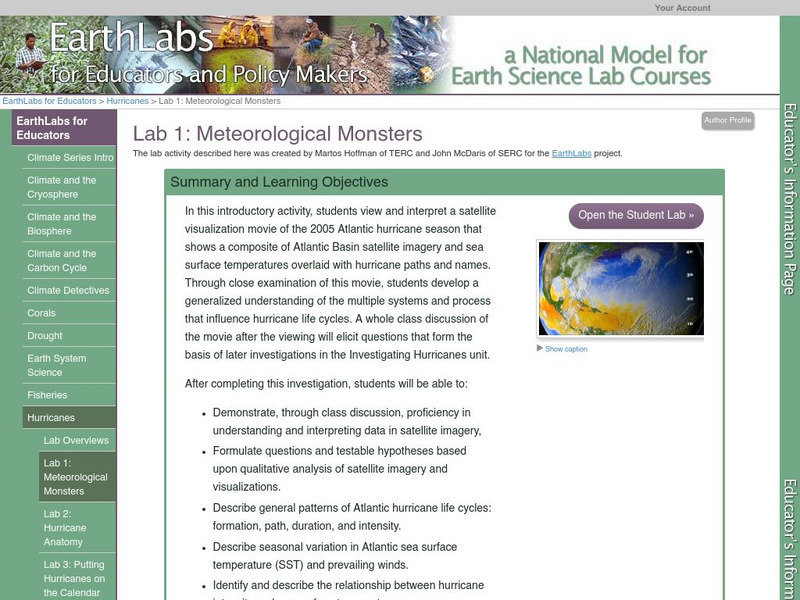Science Education Resource Center at Carleton College
Serc: Lab 7: Is Your Region Ready for a Drought?
A lab experiment in a series of experiments that explores droughts. In this particular lesson, students look at the impact a drought would have on their own community by exploring the economic, environmental, and social consequences of a...
Science Education Resource Center at Carleton College
Serc: Lab 8: Drought Mitigation Trade Offs
A lab experiment in a series of experiments that explores droughts. In this activity, students research drought mitigation technologies and their cost and benefits. They present their findings to the class with physical models and make a...
Science Education Resource Center at Carleton College
Serc: Lab 1: Plenty of Fish in the Sea?
A lab experiment in a series of experiments that investigate fisheries. In this lab experiment, students learn about the future of the global fishing industry by reading an article and analyzing oceanic biodiversity.
Science Education Resource Center at Carleton College
Serc: Lab 2: Are You Going to Eat That?
A lab experiment in a series of experiments that investigate fisheries. During this experiment, students learn about the destruction of the world's fisheries due to obliteration and wasteful fishing practices. Students will also research...
Science Education Resource Center at Carleton College
Serc: Lab 3: Oh What a Tangled Web: Ecosystem Based Management
A lab experiment in a series of experiments that looks at fisheries. In this particular lab, students use tools like Pacific Ocean Shelf Tracking to learn about the management of fisheries through an ecosystem-based approach. During this...
Science Education Resource Center at Carleton College
Serc: Lab 4: To Fish or Not to Fish?
A lab experiment in a series of experiments that investigates fisheries. In this activity, students use an ecosystem-based management tool known as Marine Protected Areas (MPAs) to manage fisheries. This lesson also includes the students...
Science Education Resource Center at Carleton College
Serc: Lab 5: All About Air Pressure
A lab experiment in a series of experiments that explores hurricanes. Students learn about the effects of the differences in air pressure with hand-on experiments and demonstrations
Science Education Resource Center at Carleton College
Serc: Lab 6: Why Keep an Eye on the Barometer?
A lab experiment in a series of experiments that explores hurricanes. For this particular lab, students will study data from 2005 hurricane season including Hurricane Katrina. Students compare air pressure and wind speed and also "they...
Science Education Resource Center at Carleton College
Serc: Lab 7: Hurricanes and Heat Transfer
A lab experiment in a series of experiments that explores hurricanes. In this lab experiment, students explore heat transfer and phase transitions as it relates to hurricanes.
Science Education Resource Center at Carleton College
Serc: Lab 8: Hot Water and Hurricanes
A lab experiment in a series of experiments that explores hurricanes. In this lab experiment, students will investigate the concepts of heat energy and specific heat of water to explore issues related to the rapid intensification of...
Science Education Resource Center at Carleton College
Serc: Lab 9: Death and Destruction
A lab experiment in a series of experiments that explores hurricanes. In this lab experiment, students research the major causes of death in hurricanes by examining photos or videos of hurricane damage. Students will also make a plan to...
Science Education Resource Center at Carleton College
Serc: Lab 3: Discovering Local Data
An investigation that is part of a series of lab lessons that expose students to Earth Systems through research, data, and visulazations. This lab specifically has students using a database to gather and graph data to understand the role...
Science Education Resource Center at Carleton College
Serc: Lab: Conservation of Mass
This lab experiment shows students that mass is not gained or lost during a chemical reaction. Lab also includes a set of lab questions that requires students to balance the chemical equation for the reaction that occurs in this lab.
Science Education Resource Center at Carleton College
Serc: Investigating Variables: Passengers Supported by Lifeboats
In this lab experiment, students will create a boat to discover how many pennies it can hold before sinking. Students will use variables including materials for construction, boat depth, and placement of passengers to see the...
Science Education Resource Center at Carleton College
Serc: Lab 1: Meteorological Monsters
A lab experiment in a series of experiments that explores hurricanes. This lab has students developing questions based on observations they make by doing an in-depth exploration of a "visualization showing the active 2005 Atlantic...
Science Buddies
Science Buddies: Got Iron? Measure the Concentration of Iron in Water
Iron is an important mineral essential for good health. Iron deficiency can be a problem. In this science fair project, use a simple iron test kit to measure the concentration of iron in water. This experiement is explained clearly and...
Science Education Resource Center at Carleton College
Serc: Leaf Rubbing and Plant Pressing
Students will study native plants by creating a herbarium used in plant identification. They will also complete some leaf rubbing to put in their journals. This activity is part of a series of labs about plants.
US Geological Survey
U.s. Geological Survey: Earthquake Science Fair Project Ideas
Twenty earthquake-related science fair project ideas. Each idea has a short description of a possible investigation.
Science Bob Pflugfelder
Science Bob: Make Your Own Balloon Rocket!
This site contains a brief procedure for building (and launching) a balloon powered rocket. Introduces concepts of air pressure and propulsion.
Science and Mathematics Initiative for Learning Enhancement (SMILE)
Smile: The Center of Mass
This site from the Illinois Institute of Technology provides a lab activity in which students determine the location of the center of mass of an irregularly shaped object. Observations are related to the balancing point of the object....


